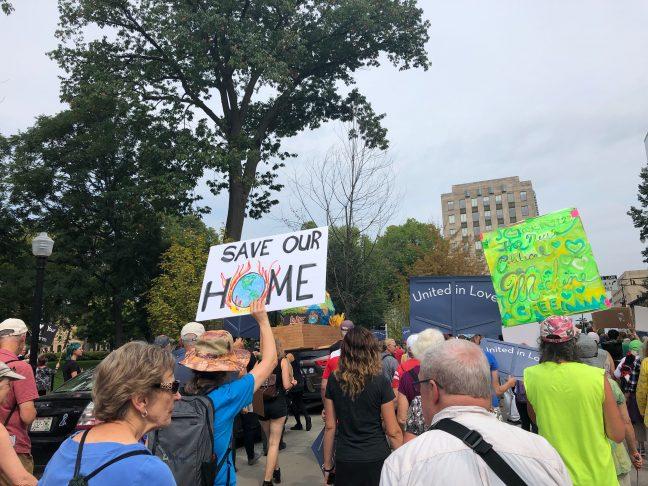Hundreds of Madisonians flooded Capitol Square on Sept. 20 in one of many demonstrations worldwide aimed at provoking global legislatures to pick up the pace on environmental reform.
Social media is raving about the success of last month’s climate strike, but does it differ from the public demonstrations of our past? We have seen protests fail throughout history — what makes this any different? Do legislators really listen to these calls to action?
There is a major difference in the Climate Movement, and she is 16 years old.
Greta Thunberg is a climate activist from Sweden who is hell-bent on convincing world leaders to increase their efforts to reduce human environmental impact. She is outspoken and fierce, and her sensational speeches have gone viral worldwide.
She is undeniably influential, and the BBC went so far as to say the following.
“Over the past year, Greta Thunberg has arguably done more to galvanise global action on climate than any other single individual,” the BBC said.
Despite Thunberg’s popularity, the movement as a whole is subject to question. While public protest is an important mechanism to the democratic process — we check our legislators by voicing our opinions — some political theorists argue that protests are not effective.
It is easy to pin the climate protests’ success on the younger generation. In reality, most social justice movements attract college-age students.
According to a HuffPost/YouGov poll, millennials ages 18 to 30 were most likely to engage in public demonstrations during the 2016 presidential election. This pattern was the same in the Vietnam protest generation of the late 1960s, and with the LGBT rights demonstrators of the 90s.
Still, global leaders seem to be paying a surprising amount of attention to public outcry recently. The environmental movement has been kicking since the 80s, and governmental support has come in waves since then. For example, the Obama administration increased environmental reform and the Trump administration took it apart. But in 2019, there has been an increase in positive headlines about worldwide leader support.
It is hard to question the efficacy of youth activism when you hear Greta’s words. She is fearless when it comes to pointing out leaders’ weaknesses and she provokes them to respond.
Thunberg also has Aspergers, which she sees as her “superpower, allowing her to cut through the noise and see to the heart of the issue” the BBC said.
Sometimes it takes someone unique to raise awareness for a common issue. There is no doubt Thunberg is a diamond in the rough, and the world is waiting to hear what she says next.
To close out this column, here’s a portion of Greta Thunberg’s speech at the UN Climate Summit. No further description necessary.
“This is all wrong. I shouldn’t be up here, I should be back at school on the other side of the ocean. Yet, you all come to us young people for hope. How dare you.”
“You have stolen my dreams and my childhood with your empty words, and yet, I am one of the lucky ones!”
“People are suffering! People are dying! Entire ecosystems are collapsing! We are in the beginning of a mass extinction, and all you can talk about is the money, and the fairytales of eternal economic growth!”
“How dare you!”
Emma Axelrod (eaxelrod@wisc.edu) is a sophomore studying political science and journalism.


